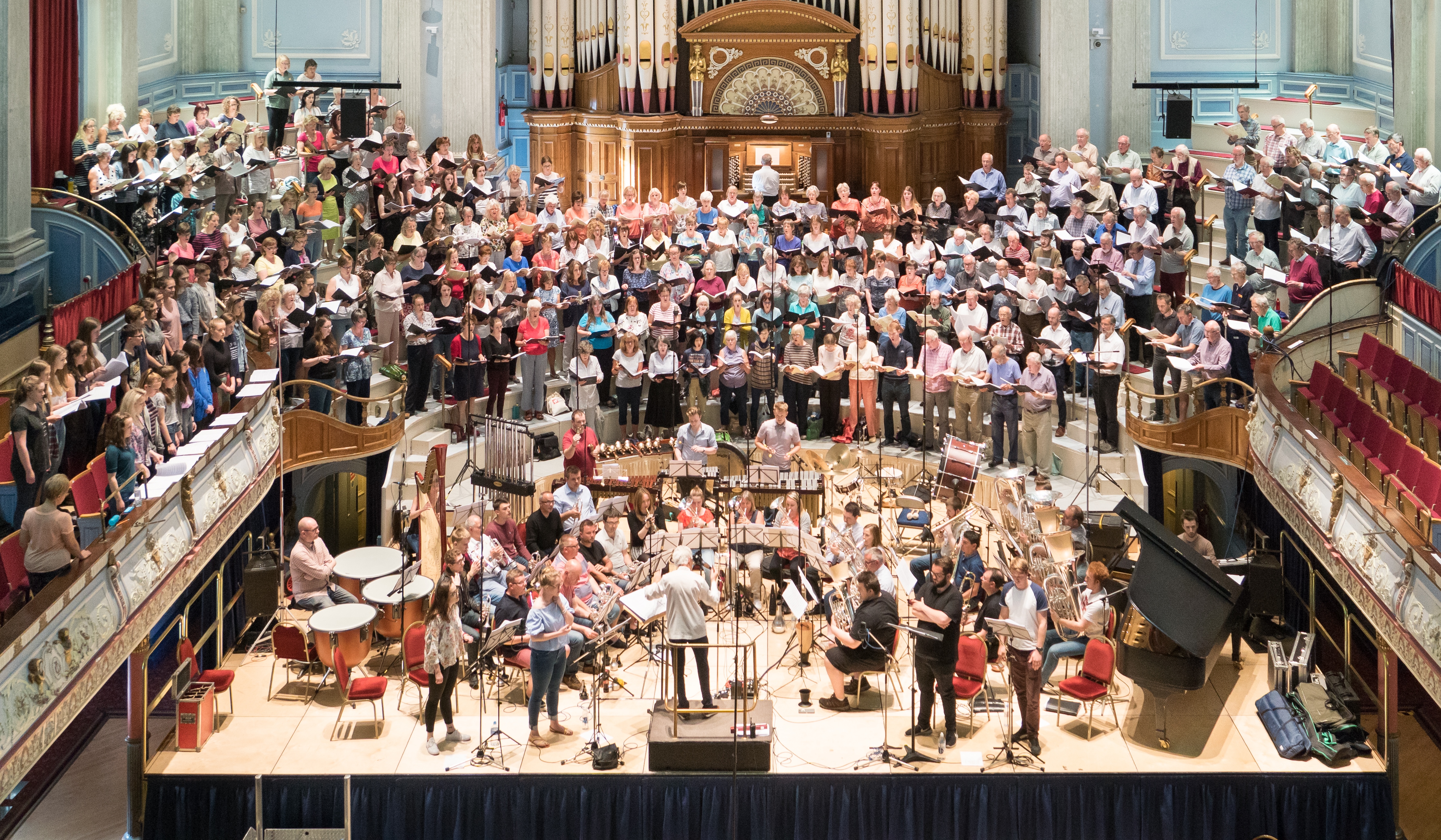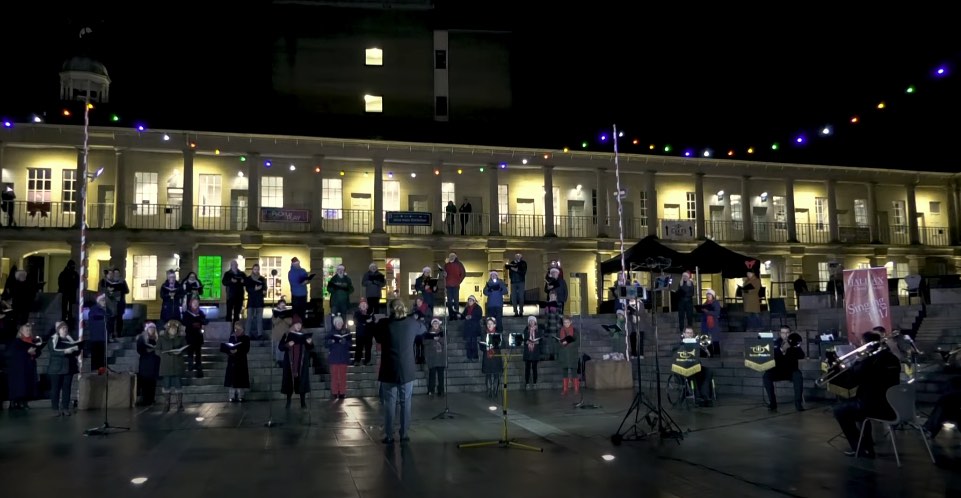
William Priestley (1779-1860), the cousin of Ann Walker of Gentleman Jack fame, was an accomplished amateur musician with a particular interest in German music. He is generally credited with founding Halifax Choral Society, mainly because it was at a ‘musical evening’ at his home in Lightcliffe for a group of prosperous middle-class friends in 1817 that the seeds of Halifax Choral Society were sown. The after-dinner discussion led to the formation of the Halifax Quarterly Choral Society, and although quarterly performances continued, the ‘Quarterly’ bit of the name was eventually dropped in 1839. The Society made its debut with a performance of Haydn’s Creation on 9th February, 1818, and has continued to present a public concert at least once a year since, making it the oldest choral society with this record in the world.

Priestley was to remain a key figure in Halifax Choral Society for 42 years, not only as a singing member, but as a promoter of a wide repertoire of music. He collected scores, which he then copied out and annotated for the use of the Society, and some of these rare manuscripts remain in our archive. In particular, he acquired an edition of Handel’s Judas Maccabeus with Mozart’s embellishments, which is now on loan to West Yorkshire Archive Service, Calderdale District Archives.
HCS may have been inaugurated by well-to-do businessmen, but it drew its membership and soloists from a wide social spectrum. One soprano who performed with the Society from 1839 was particularly famous in her day. Mrs. Sunderland was the daughter of a gardener, married to a butcher, whose early employment was in a textile mill, and whose first singing teacher was the local blacksmith. Known as the ‘Calderdale Nightingale’, her sparkling vocal talent was to promote not only her own musical career, but the prestige of Halifax Choral Society and the West Riding in general. In 1860 she was a soloist at a command performance of the united Leeds, Halifax and Huddersfield Choral Societies for Queen Victoria and Prince Albert at Windsor Castle.
During the Victorian period, HCS developed a close relationship with Felix Mendelssohn, many of whose works HCS was instrumental in introducing to Britain. In gratitude, he dedicated his setting of Psalm 114, ‘When Israel Out of Egypt Came’ to the Society which they first performed in 1842.

Halifax Choral Society continued to perform through both World Wars, including the, by now, annual tradition of a Messiah performance – a tradition that continues to this day. The post-war period, however, presented financial challenges. A local newspaper commented after a performance of Mozart’s Requiem in 1951 that ‘none can envy those who nowadays, in a town like Halifax, have to reconcile adventurous programme building with the balance sheet’. This is still a balancing act for the choral society in the 21st century. Providing professional-quality concerts has always been an aim of the choral society, and was a point of pride for the two conductors who were to steer the choir through the second half of the 20th century and into the 21st. Donald Hunt, who was our conductor from 1957-1988, and John Pryce Jones (conductor, 1988-2019) maintained a high standard of music-making, and our current artistic director, Anthony Gray, is keen to continue this tradition.
Halifax Choral Society celebrated its bicentenary in 2017 by commissioning a new oratorio, The Holy Face, by Philip Wilby. It tells the story of John the Baptist, who is Halifax’s patron saint, and was scored for both orchestra and brass band. We recorded a CD of the oratorio in Huddersfield Town Hall with Black Dyke Band. The orchestral version was premiered in October 2017 with Halifax Choral Society, Sheffield Philharmonic Chorus and an ensemble of young singers from the Yorkshire Youth Choir.

Photo by Mike Bentley
Halifax Choral Society has performed in a wide range of venues over the years, from pub or hotel rooms to Town Halls, from wind-swept moors (for a filming of an extract from the Bronte Mass) to major concert venues such as Manchester’s Bridgewater Hall and Aldeburgh’s Snape Maltings. Halifax lacks the splendid concert space of Huddersfield Town Hall but in 1901 HCS began to perform at the Victoria Theatre, which had been built (complete with a huge pipe organ ‘with pneumatic action throughout’) specifically for choral performances. Later changes such as the addition of a proscenium arch have made the acoustic less friendly to a choir, but HCS continues to perform there, particularly the annual Carols and Brass Christmas concert with Black Dyke Band. The close relationship with Halifax Minster also continues. Halifax’s Grade 1-listed 18th century Piece Hall had been the location for choral events during the second half of the 19thcentury, but was deemed unsuitable for outside concerts in 1890. Yorkshire weather notwithstanding, Halifax Choral Society revived the practice under the pressures of the Covid 19 pandemic, and recorded and filmed a Christmas concert in 2020 and a summer concert in 2021. We hope this association will continue and prosper.
Click Here for more about our performance history and Here for a COMPLETE (26 pages) list of EVERYTHING we have performed since 1818

Sources:
John A. Hargreaves, Every Valley Shall Be Exalted, Halifax Choral Society, 1818-2018, D&M Heritage Press, 2019
Rachel Cowgill, ''The Most Musical Spot for Its Size in the Kingdom': Music in Georgian Halifax', Early Music, Nov. 2000, Vol.28,No.4, pp.557-575



